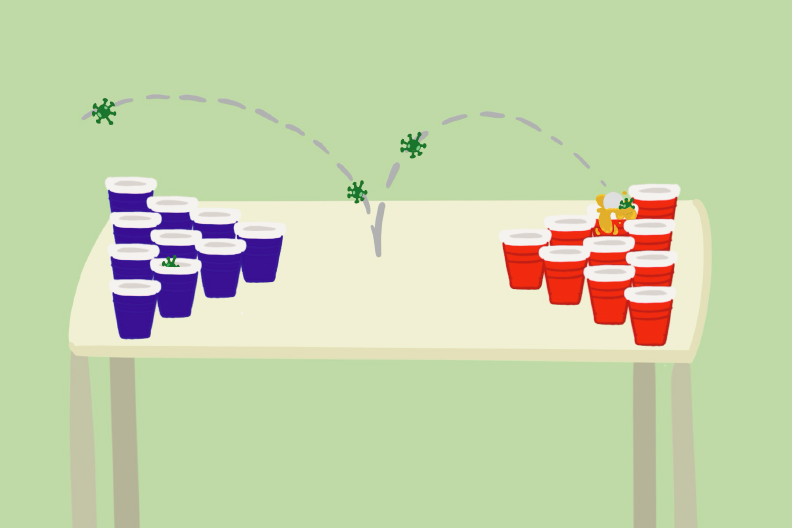Collegiate social gatherings often spread illness during the start of an academic school year. Graphic by Reece Butler and Elizabeth Hein.
MAIRIN MCCARTHY | STAFF REPORTER | mkmccarthy@butler.edu
Almost as sure as the change in weather and the falling of leaves is the influx of sickness on campus. Butler students and staff encounter runny noses and coughs as they adjust to new environments, people and the germs that naturally follow.
According to the National College Health Assessment, 44.6% of college students reported being diagnosed with either a respiratory or flu-like illness during their academic year in fall 2023.
“Frat flu” is often used to describe the illness that spreads after social gatherings associated with the collegiate party scene. It typically appears during the beginning of the school year when students’ immune systems haven’t adjusted to shoulder-to-shoulder social crowds.
The influx of crowded dining areas and lecture halls causes the sickness to spread to other students. This cycle is recurring each school year as campuses readjust to communal interactions.
Director of health services Maxie Gardner says there are several reasons why students may feel under the weather at the onset of the semester.
“There are a couple of factors that increase illness when students return to school,” Gardner said. “One is close quarter living [and] sharing rooms and bathrooms with many different individuals. Another reason is students probably aren’t getting enough rest. They might be staying out later, and when you’re not getting as much rest, [that] puts a person at risk for certain [illnesses.]”
Senior healthcare and business major Rachel Meighan has firsthand experience with how the spread of illnesses impacts her academic performance and social availability.
“It is really hard to keep up with classes when you’re sick, even if you miss two classes,” Meighan said. “This could be a class where you only have it two times a week … so if you’re sick for three days and you miss a whole week of class, that can really set you up for failure.”
Illness trends impact more than just students; faculty have also experienced the elevated risk of illness.
Assistant professor of strategic communication Alexander Carter is a faculty-in-residence at Residential College. Carter has noticed differences in student wellness during this time of year.
“[As a faculty-in-residence] I’ve noticed fewer students in common areas around this time of year,” Carter said. “There’s always an impact [in class attendance]; you have students come from all over and people catch something and it spreads around.”
Not only has Carter detected wellness changes in students, but the increased spread of illness has also impacted his health.
“After dodging being sick since [the COVID-19 pandemic], my first semester as a faculty-in-residence last year, I caught COVID-19 for the first time ever,” Carter said. “After not being sick for a few years, it [was] a shock to start getting sick again.”
While illnesses like the frat flu are prevalent on college campuses, they are controllable. Health Services — located in the Health and Recreation Complex — is a primary care clinic, available to students through appointment or phone call, where students can speak with a nurse for advice, even if they are unsure about their symptoms.
“We’re not an urgent care clinic, so we’re just like your doctor’s office back at home,” Gardner said. “If a student is in doubt and doesn’t know what to do, I encourage them to call Health Services and talk to one of our nurses. We’ll answer many of your questions just right over the phone.”
There are also two healthcare vending machines on campus that are available to students 24/7. The machines are located in Atherton Union and the HRC and are stocked with COVID-19 test kits, cough drops and over-the-counter medications.
Another resource available to students is the annual flu vaccine clinic. Medical professionals from Employer Wellness Solutions Indiana will administer flu vaccines from Oct. 8-12 in the HRC and Fairview Community Room.
“The number one thing [for students to do] in preventing these illnesses [like COVID-19] and the flu is to get vaccinated,” Gardner said. “Secondly, is the importance of hand washing and hygiene and [getting] a good night’s rest. Your nutrition [and] staying hydrated [also] certainly plays a role in remaining healthy.”
Students can make an appointment with Health Services specialists online or by phone call. Taking care of your health and reducing the spread of germs is the most effective way to keep yourself and others in good health during flu and cold season.



